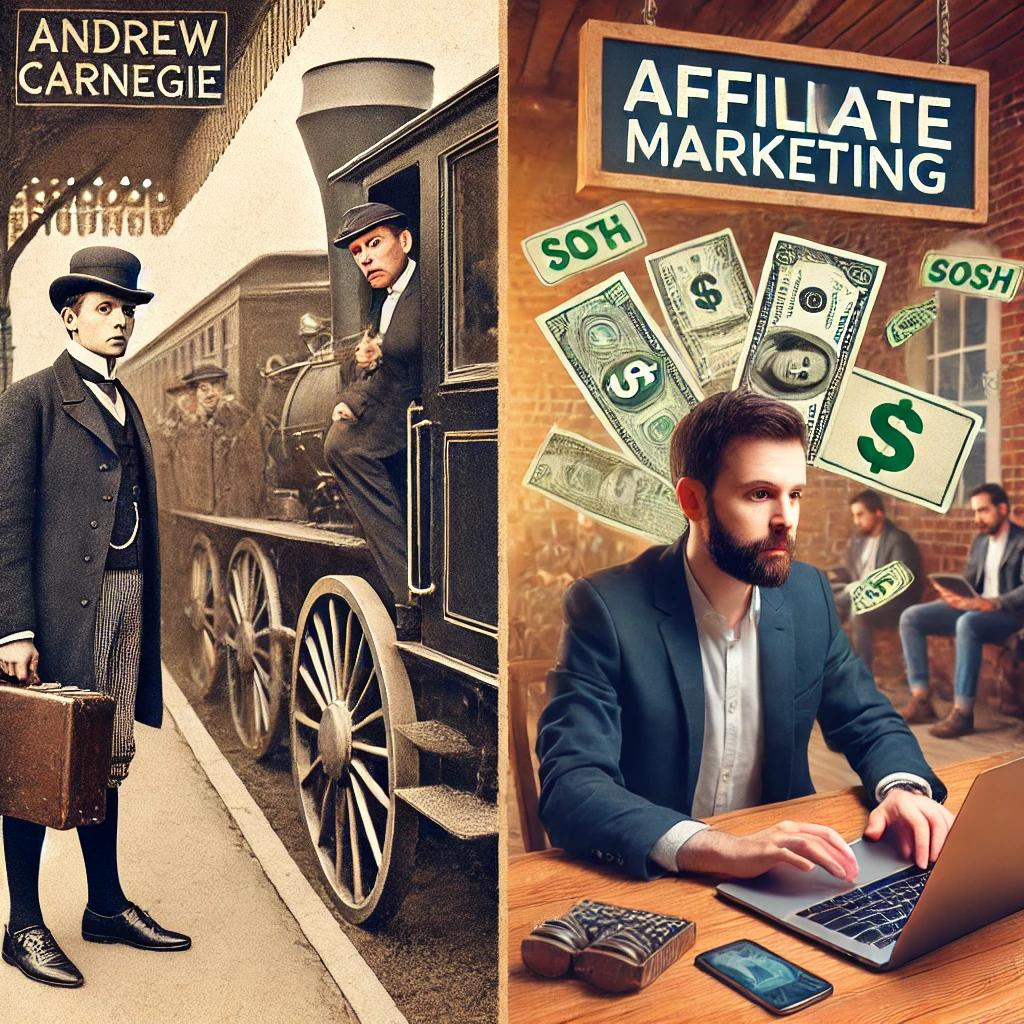Mastering Affiliate Marketing: Proven Strategies for Boosting Conversions and Selecting the Right Niche

Affiliate marketing can be a powerful way to generate passive income, but like Andrew Carnegie getting kicked off a train for not carrying cash, many affiliate marketers find themselves metaphorically stranded. They have the traffic, but they’re missing the tools, strategies, or profitable offers that could take them from barely getting by to truly thriving.
Success in affiliate marketing requires the right preparation—just like having your train fare ready. From choosing the best niche to leveraging social media to promote high-ticket offers, here’s how you can transform your affiliate marketing game and avoid watching opportunities zoom away without you.
Selecting a Profitable Niche
The first and most critical step in affiliate marketing is selecting the right niche. It’s easy to get caught up in popular trends, but the key is finding a balance between passion and profitability. Some affiliate marketers get too excited about jumping into highly saturated markets without realizing how difficult it can be to break through the noise.
Consider evergreen niches like health, personal finance, or technology. These areas consistently have demand and provide room for niche subcategories where you can position yourself as an authority. For example, within the broad “health” niche, you could focus on keto diets or mental wellness. These sub-niches can attract a more engaged audience, leading to higher conversion rates.
Keep in mind that profitability isn’t just about popularity. It’s about finding a space where you can offer solutions. High-ticket items like software or luxury products often have fewer competitors but offer higher commissions. Take time to research different affiliate programs and products to find ones with recurring commissions, subscription models, or big one-time payouts. Picking a profitable niche is like having the right MAP for your journey—without it, you’re wandering aimlessly.
Crafting a Conversion-Boosting Strategy
Once you’ve chosen your niche, the next challenge is turning traffic into conversions. Driving traffic is essential, but converting that traffic into buyers is where the magic happens. One mistake many affiliate marketers make is focusing too much on driving traffic without optimizing their Content to convert that traffic into sales.
The first step in boosting conversions is ensuring your Content is tailored to your audience’s needs. Whether through blog posts, emails, or social media, each piece of Content should solve a problem for your readers. Highlight the pain points your product addresses and use real-world examples to demonstrate its effectiveness.
In the email example above, Andrew Carnegie’s story connects directly with the idea that affiliate marketers can have all the traffic in the world but still fail if they’re not prepared. Creating relatable, compelling narratives can make your promotions more memorable and effective.
Another crucial strategy is building trust. People don’t buy from people they don’t trust. Be transparent with your audience about your affiliate relationships, but more importantly, show them that you only recommend products you believe in. Case studies, reviews, and testimonials from satisfied customers add credibility and help potential buyers feel confident in their decision.
Leveraging Social Media for Affiliate Marketing
In the digital arena, social media is a goldmine for affiliate marketers. Platforms like Instagram, TikTok, and YouTube allow you to connect directly with your audience, showcase products, and build trust on a more personal level. Social media is especially powerful for promoting affiliate products that resonate emotionally with your audience, such as fitness products, beauty items, or online courses.
However, social media marketing requires more than just posting affiliate links. To truly leverage these platforms, focus on building a community. Post consistently and engage with your followers by responding to comments, asking questions, and showing up in live sessions. The more you interact with your audience, the more trust you build, and the higher your conversions will be.
Also, don’t sleep on the potential of paid social media ads. Using Facebook ads or Instagram promotions can help you reach a targeted audience that’s more likely to be interested in your offers. Combine these strategies with influencer marketing—partnering with niche influencers who already have the audience you want—and you’ve got a recipe for high conversion rates.
Using High-Ticket Offers to Maximize Earnings
While many affiliate marketers focus on low-ticket items like physical products from Amazon, seasoned marketers know that promoting high-ticket items can significantly increase your earnings. High-ticket offers, such as online courses, software solutions, or premium subscription services, can yield commissions of $500 to $3,000 or more per sale.
Promoting high-ticket items requires more effort in terms of building trust and educating your audience. A customer needs to feel confident that they’re making the right decision before committing to a high-priced product. This is where Content marketing becomes essential. Provide in-depth reviews, tutorials, or case studies that show how the product can solve a problem or improve your audience’s life.
A great way to sell high-ticket products is through webinars. In the sales page example, John Thornhill’s Ambassador Program is promoted with a done-for-you webinar funnel that can pay affiliates thousands per sale. Webinars allow you to present high-value Content to your audience, answer questions in real-time, and build a personal connection—all of which are crucial for closing high-ticket sales.
By focusing on high-ticket offers, you can make more money with fewer sales. This approach allows you to maximize your efforts, especially when combined with a strategy that drives targeted traffic.
Automating Your Affiliate Marketing Business
Automation is the final key to scaling your affiliate marketing business. You don’t need to be a technical genius to automate significant parts of your marketing, but you do need the right tools. email marketing platforms like AWeber or GetResponse can help you set up autoresponder sequences that promote your affiliate offers on autopilot. When combined with lead magnets—free resources that capture emails—you can build a funnel that works 24/7 to drive conversions.
Additionally, using tracking tools ensures you understand where your traffic and sales are coming from. Many affiliate marketers fail to optimize their strategies because they’re not tracking which channels perform best. Tools like ClickMagick or Google Analytics can give you insight into which social media platforms, blog posts, or email campaigns are driving the most conversions.
By automating these processes, you free up time to focus on creating high-quality Content and building relationships with your audience. In the long run, automation helps you grow your affiliate marketing business faster and with less manual effort.
Conclusion
Affiliate marketing, like any business, requires careful planning and execution. From choosing a profitable niche to crafting a strategy that converts traffic into sales, and leveraging social media to promote high-ticket offers, success depends on having the right tools at the right time. With automation, you can scale your business while keeping operations streamlined.
Don’t let opportunities pass you by because you didn’t have the right plan in place. Equip yourself with these strategies, and you’ll be prepared to ride the affiliate marketing train all the way to success. Get a 7 Day Free Trial Here!

